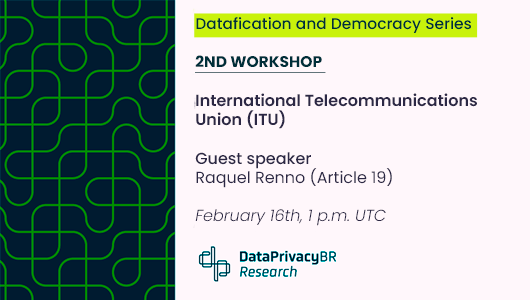Our second workshop of a series about technical forum talks about the International Telecommunications Union
In the second meeting of the Datafication and Democracy Workshop Series, we received Raquel Renno, Digital Programme Officer of Article 19, who spoke about the International Telecommunication Union (ITU) for third sector organizations.
Last February 16th, a Workshop about the International Telecommunications Union (ITU) was hosted by the Data Privacy Brasil Research Association. It was the second event of the Datafication and Democracy Series, a learning series about the relationship between datafication processes and democracy issues at international technical forums.
This time, we had a presentation led by Raquel Renno, Digital Programme Officer of Article 19 focused on spectrum management issues, primarily in but also around the ITU’s Radiocommunication Sector. Renno has been working with topics related to human rights and the social impact of digital technologies since 2003 in educational and digital rights organizations, and since 2010 she is a member of the International Center for Information Ethics (ICIE).
In this encounter, which was designed to provide collective learning, we tried to convey the message that the ITU should not be left as a space dominated solely by technical experts. So, stay here with us! In this blog post, we will tell you more about the workshop.
The ITU structure
The International Telecommunication Union (ITU) was founded in 1865, and since then, the agency has worked to promote international cooperation in the field of information and communication technologies (ICTs).
Considering this, Renno started her presentation by talking about the ITU’s overall structure, which consists of three key sectors: the Radiocommunication Sector (ITU-R), the Standardization Sector (ITU-T), and the Development Sector (ITU-D).
In general knowledge, the ITU’s three sectors have distinct responsibilities. The ITU-R sector is responsible for coordinating the use of radio-frequency spectrum and satellite orbits worldwide. It sets standards for radio equipment and systems, as well as develops technical guidelines for ensuring the safe and efficient use of radio frequencies. The ITU-T has its focus on developing and coordinating global standards for ICTs, such as telecommunications networks, multimedia, and Internet Protocol (IP)-based networks. It also ensures the interoperability of ICTs, which means that different systems can communicate with each other effectively. Finally, the ITU-D sector focuses its efforts to expand access to ICTs, particularly in least-developed countries, by developing and implementing ICT-based solutions to global challenges such as climate change, healthcare, education, among others.
A rich overview of the main activities and the agenda of each sector
The Radiocommunication Sector was established in 1927, and its responsibilities have evolved over time to keep pace with technological advancements. In a few words, the presentation underlined that, nowadays, the main ITU-R sector´s goals are defined as (i) to ensure the rational, equitable, efficient, and economical use of the radio-frequency spectrum by all radio communication services; (ii) to ensure interference-free operations of radiocommunication systems; (iii) to accommodate the launch of new services and facilitate any new developments. Considering this profile, some of the topics – which are constantly changing – being currently discussed in study groups of the ITU-R are spectrum management; radio wave propagation; satellite services; terrestrial services; broadcasting services; and science services.
As Renno commented, the goal for somebody with a human rights background may aim “to find possible harmful consequences of the proposed technical criteria and standards”, for example, as she is doing there. This gives an idea of how human rights activists approach when navigating in this very technical space and highlights the importance of their advocacy. That said, Renno shared with us the characteristics of the main meeting and conferences of the ITU-R sector, which can help us follow, though not always directly, its key moves. As Renno explained, the Assemblies and Study Groups have a more continuous flow. Unlike the World Radiocommunication Conference – which happens every four years –, which is responsible to revise the regulations and associated frequency assignment; to address any related matter of worldwide character, and to determine questions for study by Assembly and its Study Groups.
Moving forward, the Standardization Sector, or ITU-T, was established in 1947, and its mission has expanded to cover a wide range of ICT-related standards. Its work focuses on the technical aspects of the telecommunications industry, including network architecture, protocols, and equipment interoperability.
The ITU-T comprises several study groups that are responsible for creating standards and recommendations for various areas of telecommunications. Study Group 2 deals with operational aspects of service provision and telecoms management, while Study Group 5 focuses on the environment and climate change. The ITU-T Study Group 9 is responsible for developing standards related to broadband cable and TV, including new technologies, accessibility, and cybersecurity concerns related to broadband cable and TV networks. Study Group 12 deals with performance, Quality of services (QoS), and Quality of experience (QoE), and Study Group 13 is dedicated to next-generation networks. Optical and other transport network infrastructures fall under the jurisdiction of Study Group 15. Study Group 16 focuses on multimedia services, applications, and terminals, while Study Group 17 addresses cybersecurity. Finally, Study Group 20 is responsible for the Internet of Things and smart cities. Connecting with that, Reno highlighted that IoT, smart cities, biometric systems, AI systems, and metaverse are “examples of emerging technologies discussed and standards defined in the T sector”.
Looking ahead, Renno commented that ITU-D’s main goals are related to fostering international cooperation on ICT development issues; enhancing confidence and security in the use of telecommunication and ICTs; building human and institutional capacity, and providing assistance to countries with special needs.
First things first, the Development Sector is known as the policy-oriented sector. This way, Renno confirmed that it is at the ITU-D where it is possible to identify a higher number of Civil Society Organizations (CSOs) attending the meetings, and consequently where we, digital and human rights actors, could work together to build our common goals and strategies more easily. But, it is important to have in mind that the recommendations and best practices from the ITU-D, unfortunately, are not binding. Which, right off the bat, can lead to disappointment.
Still, regarding ITU-D, Renno presented the main discussion instances: The Study Groups; the Global Symposium for Regulators (GSR); World Telecommunication/ICT Indicators Symposium (WTIS); and the World Telecommunication Development Conference (WTDC), a forum which occurs every four years and brings together representatives from governments, private sector, academia, and civil society, and in which the member-states adopt resolutions and recommendations.
Is the ITU or isn’t it truly an open space for civil society?
Differently from other technical forums – such as the Institute of Electrical and Electronics Engineers, Inc. (IEEE) or the Internet Corporation for Assigned Names and Numbers (ICANN) –, the ITU has a multilateral governance structure, being an UN agency. Although actors like the private sector, academia, and non-profit organizations can take a part as members (there’s a 71,550 Swiss Franc fee to be paid if you are approved by the ITU), they do not have the right to vote. It is because, in theory, only the member-States have the final word.
Private sector members are organized into Sector Members and Associates, as well as many State Delegations. So, they occupy a favored position that allows them to participate in many ITU activities and contribute to the ITU decision-making processes. It is well-known that the ITU tends to be a space dominated by experts in technical aspects and by representatives of the private sector, with little effective civil society participation.
Often, the technical language used by experts can make it difficult for people outside the field to participate, and financial barriers can also be an obstacle to effective participation in ITU events. This way, the workshop confirms that there is still a long road to pave in order to make the ITU a truly open and inclusive space.
The Data Privacy Brazil Research Association remains committed to actively engaging civil society in technical forums, and will be promoting other activities aiming to build civil society’s capacity to participate in these technical spaces. Stay tuned to our website for information on the upcoming workshops of this series.
Veja também
-
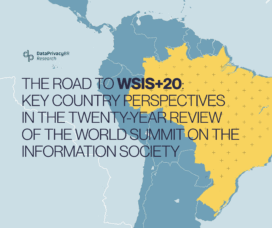
The Road to WSIS+20: Key Country Perspectives in the Twenty-Year Review of the World Summit on the Information Society
This report aims to support engagement in the WSIS+20 process by providing insight into the positions and priorities of selected governments.
-
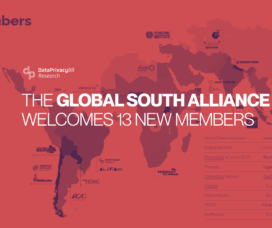
The Global South Alliance welcomes 13 new members
The Global South Alliance is a coalition formed in 2022 with the mission of unifying NGOs dedicated to the promotion of mutual learning and the advancement of digital rights with a perspective from the Global South. In May, the Global South Alliance welcomed 13 new members, reaching the total number of 26 organisations.
-

Job Opening: Digital Librarian
The Data Privacy Brasil makes the notice public with registrations until July 11th.
-
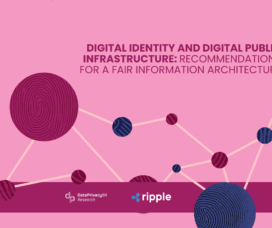
Report | Digital Identity and Digital Public Infrastructure: recommendations for a fair information architecture
Data Privacy Brasil launches its new report entitled “Digital Identity and Digital Public Infrastructure: recommendations for a fair information architecture”. The study examines the impact of a Digital Public Infrastructure (DPI), especially digital identity applications, on the protection of personal data in light of the Brazilian Federal Constitution (CF) and the General Data Protection Law (LGPD).
-

Five-Point Plan for an Inclusive WSIS+20 Review
As stakeholders engaged in the WSIS+20 Review process, organizations sign the petition presenting recommendations to help operationalize the WSIS+20 review modalities in order to ensure transparency, inclusion, and meaningful stakeholder engagement.
-
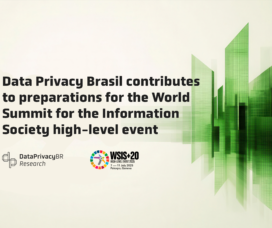
Data Privacy Brasil contributes to preparations for the World Summit for the Information Society high-level event
The event, which is co-organized by the ITU, UNESCO, UNDP, and UNCTAD, takes place in July, and this March, stakeholders were able to send their suggestions regarding the format and content to be debated, especially in light of the review process.
-
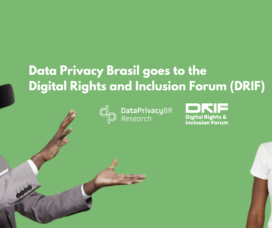
Data Privacy Brasil goes to the Digital Rights and Inclusion Forum (DRIF)
For the third consecutive year, Data Privacy Brasil will participate in the Digital Rights and Inclusion Forum (DRIF). DRIF – formerly known as the Internet Freedom Forum (IFF) – is an annual forum organized by Paradigm Initiative (PIN), since 2013, to be a space for discussions on global issues related to digital rights and inclusion.
-
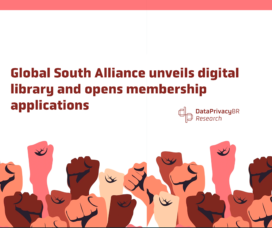
Global South Alliance unveils digital library and opens membership applications
The GSA invites organizations to express their interest in joining the network by completing the application form available until April 24.
Veja Também
-

The Road to WSIS+20: Key Country Perspectives in the Twenty-Year Review of the World Summit on the Information Society
This report aims to support engagement in the WSIS+20 process by providing insight into the positions and priorities of selected governments.
-

Job Opening: Digital Librarian
The Data Privacy Brasil makes the notice public with registrations until July 11th.
-

Report | Digital Identity and Digital Public Infrastructure: recommendations for a fair information architecture
Data Privacy Brasil launches its new report entitled “Digital Identity and Digital Public Infrastructure: recommendations for a fair information architecture”. The study examines the impact of a Digital Public Infrastructure (DPI), especially digital identity applications, on the protection of personal data in light of the Brazilian Federal Constitution (CF) and the General Data Protection Law (LGPD).
-

Five-Point Plan for an Inclusive WSIS+20 Review
As stakeholders engaged in the WSIS+20 Review process, organizations sign the petition presenting recommendations to help operationalize the WSIS+20 review modalities in order to ensure transparency, inclusion, and meaningful stakeholder engagement.
-

Data Privacy Brasil contributes to preparations for the World Summit for the Information Society high-level event
The event, which is co-organized by the ITU, UNESCO, UNDP, and UNCTAD, takes place in July, and this March, stakeholders were able to send their suggestions regarding the format and content to be debated, especially in light of the review process.
-

Data Privacy Brasil goes to the Digital Rights and Inclusion Forum (DRIF)
For the third consecutive year, Data Privacy Brasil will participate in the Digital Rights and Inclusion Forum (DRIF). DRIF – formerly known as the Internet Freedom Forum (IFF) – is an annual forum organized by Paradigm Initiative (PIN), since 2013, to be a space for discussions on global issues related to digital rights and inclusion.
-

Global South Alliance unveils digital library and opens membership applications
The GSA invites organizations to express their interest in joining the network by completing the application form available until April 24.
-
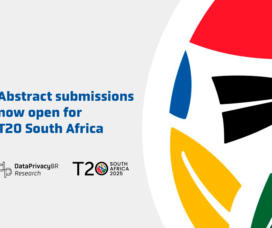
Abstract submissions now open for T20 South Africa
The Think20 South Africa invites researchers from around the world to contribute to a dynamic exchange of ideas on today's most pertinent challenges. The deadline for submitting abstracts is February 10, 2025.
-
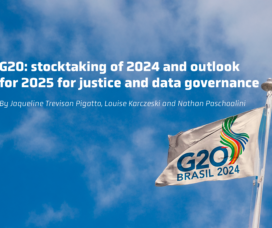
G20: stocktaking of 2024 and outlook for 2025 for justice and data governance
In 2024, Data Privacy Brasil took on a new and exciting challenge: participating in the G20 ecosystem, during the Brazilian presidency, through the official engagement group for think tanks, Think 20 (T20). Check out the text to learn more about Data's work at the G20.
-
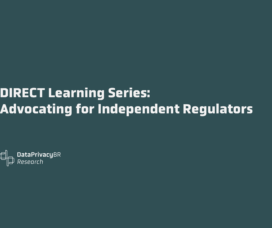
DIRECT Learning Series: Advocating for Independent Regulators
The 6th workshop took place on November 6th, 2024, in the context of the Data Rights and Enforcement through Community Trust (DIRECT) Learning Series, an ongoing thematic series of workshops with members of the DIRECT consortium, supported by Internews.
-
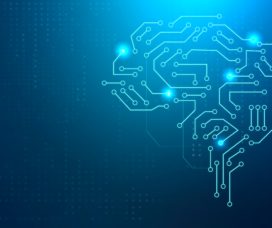
Exploring Opportunities in the Digital Economy and AI at the G20
The task force 5 of T20 Brasil has engaged several international think tanks to provide ideas and policy proposals on crucial areas of technological development, such as AI and Digital Public Infrastructures. This includes encouraging G20 nations to adopt policies that protect individual rights while fostering innovation.
-

DIRECT Learning Series: data protection training and capacity building
The 5th workshop took place on October 2nd, 2024, in the context of the Data Rights and Enforcement through Community Trust (DIRECT) Learning Series, an ongoing thematic series of workshops with members of the DIRECT consortium, supported by Internews.
-
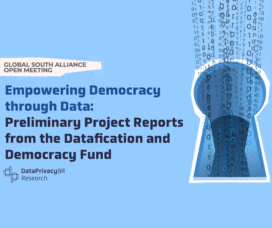
Empowering Democracy through Data: preliminary project reports from the DDF
The Global South Alliance wil host its next open meeting on October 22, 2024, where grantees from the first cohort of the Datafication and Democracy Fund (DDF) will present their impactful research.
-
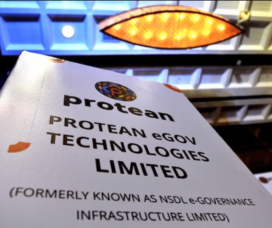
Protean acknowledged for leadership in digital public infrastructure
A report from Data Privacy Brasil underscores how DPI can be leveraged to create environments where data privacy and security are prioritized.
-
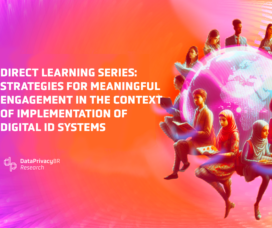
DIRECT Learning Series: strategies for meaningful engagement in the context of implementation of Digital ID systems
This workshop took place on August 28th, 2024, in the context of the Data Rights and Enforcement through Community Trust (DIRECT) Learning Series, an ongoing thematic series of workshops with members of the DIRECT consortium, supported by Internews.
-
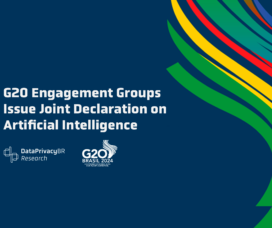
G20 Engagement Groups Issue Joint Declaration on Artificial Intelligence
On Tuesday (10), the main G20 engagement groups, including Civil 20 (C20), Labor 20 (L20), Think 20 (T20) and Women 20 (W20), announced a groundbreaking joint statement on the ethical, sustainable and inclusive development and deployment of artificial intelligence (AI).
-
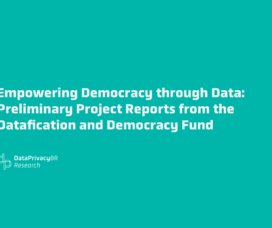
Empowering Democracy through Data: Preliminary Project Reports from the Datafication and Democracy Fund
The Global South Alliance held its first meeting with the organizations covered by the Datafication and Democracy Fund. On the occasion, each of the five organizations - Like a Palm Tree (Africa), Center of Security and Citizenship Studies (LatAm), Corporación Cambio Sostenible (LatAm), Criminal Justice & Policy Accountability Project (India), and Ikigai Innovation Initiative (Africa) - had the opportunity to present the preliminary results of their projects and hear feedbacks from the GSA members.
-
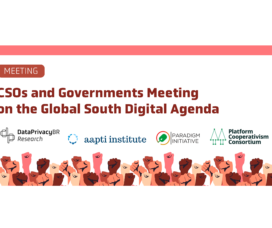
CSOs and Governments Meeting on the Global South Digital Agenda
On September 21st and 24th, the event “Open Dialogue: Global South Alliance and Governments for an Inclusive Digital Agenda” will take place, promoted by the organizations Data Privacy Brasil, Aapti Institute, Paradigm Initiative and PCC (The New School). The event aims to provide an open conversation with diplomats about the international agenda for IPRs, AI, GDC implementation and G20 continuity.
-
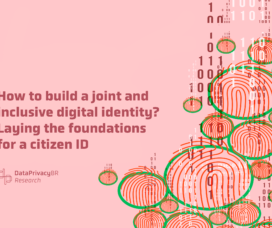
How to build a joint and inclusive digital identity? Laying the foundations for a citizen ID
Do you know what an identity is? Thinking about facilitating access to the topic, Data Privacy Brasil has developed a series of content to provide the foundations and tools possible for all the details on the subject. With this, we will be able to discuss, as a community, what we want with a digital identity and how we can achieve it.
-
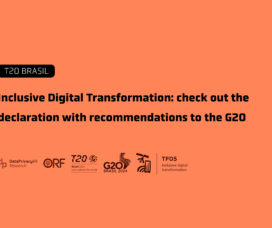
Inclusive Digital Transformation: check out the declaration with recommendations to the G20
In the document, six priorities were defined to deal with issues such as digital inclusion and meaningful universal connectivity; and challenges, opportunities and governance of artificial intelligence.
-
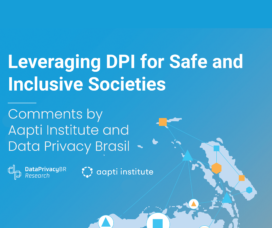
Leveraging DPI for Safe and Inclusive Societies
Aapti and Data Privacy Brasil have submitted their contribution to the Office of the United Nations Secretary-General's Envoy on Technology (OSET) and the United Nations Development Programme (UNDP) regarding the report "Leveraging DPI for Safe and Inclusive Societies".
-
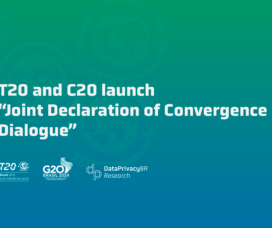
T20 and C20 launch “Joint Declaration of Convergence Dialogue”
On the 2nd and 3rd of July, a Mid-Term Conference took place in Rio de Janeiro, a T20 event with the participation of leaders from national and international think tanks, members of academia, representatives of the private and public sectors and civil society to discuss and propose solutions to the main global challenges.
-

Datafication and Democracy Fund welcomes five organizations from the Global South for short-term projects
The Datafication and Democracy Fund Committee, composed of Data Privacy Brasil, Paradigm Initiative, and Aapti Institute, is pleased to announce the five organizations awarded funding for a short-term research project.
-
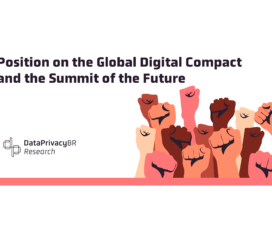
Position on the Global Digital Compact and the Summit of the Future
Between the 9th and 10th of May, the UN Civil Society Conference is happening in Nairobi. The event is presented as an opportunity to engage civil society in preliminary discussions ahead of the Summit of the Future.
-
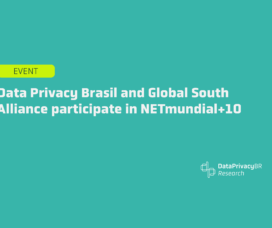
Data Privacy Brasil and Global South Alliance participate in NETmundial+10
Between April 29th and 30th, the NETmundial+10 took place in São Paulo. Building upon the event and the NETmundial Declaration of 2014, this event focused on strengthening global multistakeholder governance for the Internet and digital technologies, as well as conveying messages to global actors for better coordination of various ongoing processes.
-
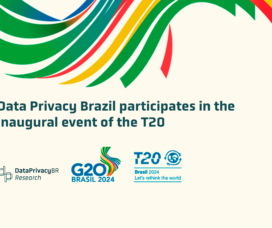
Data Privacy Brazil participates in the inaugural event of the T20
Between March 4th and 6th, the Organizing Committee of T20 Brazil - composed of CEBRI, FUNAG, and IPEA - held the first official event of the engagement group. The event took place entirely virtually and was openly broadcast to the public.
-

Inclusive Digital Transformation in the T20
The year 2024 marks Brazil's presidency in the G20, the group of the world's largest economies, chaired by our country for the first time. It is a year of great opportunity for Brazil to influence a broad global governance agenda, prioritizing issues such as inequality, climate change, and, of course, digital transformations.
-
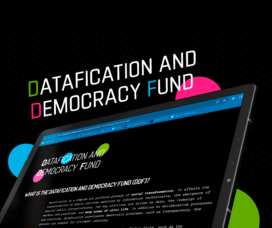
Data Privacy Brasil, Paradigm Initiative and Aapti Institute announce the launch of the “Datafication and Democracy Fund”
The fund aims to finance activities that strengthen the work of NGOs in the Global South on issues of datafication and democracy
-
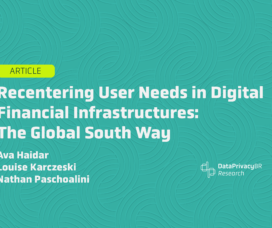
Recentering User Needs in Digital Financial Infrastructures: The Global South Way
Through India’s G20 leadership in 2023, global agendas of digital transformation and financial growth have come to be intimately reoriented to challenges, priorities and special developments in the Global South.
-

At UNCTAD eWeek, Data Privacy Brasil will discuss the intersection between digital economy and human rights in AI regulation
The UNCTAD eWeek, an initiative of the United Nations Conference on Trade and Development (UNCTAD) in partnership with eTrade for all, will occur from the 4th until the 8th of December.
-
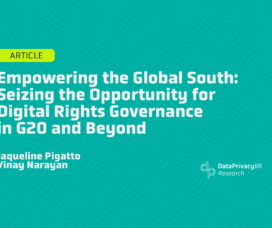
Empowering the Global South: Seizing the Opportunity for Digital Rights Governance in G20 and Beyond
The G20 represents a critical policy space for addressing emergent challenges on a global scale and its importance as a platform is pronounced when we consider its significance for the Global South.
-
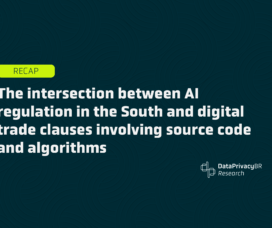
The intersection between AI regulation in the South and digital trade clauses involving source code and algorithms
Recap of Session 43 of the WTO’s 2023 Public Forum organized by Data Privacy Brasil and REBRIP
-
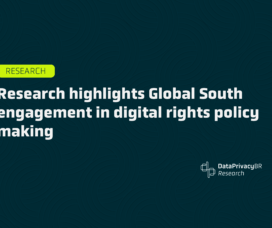
Research highlights Global South engagement in digital rights policy making
The Data Privacy Brasil Research Association announces the launch of the research report on Global South perspectives on international engagement in digital rights.
-
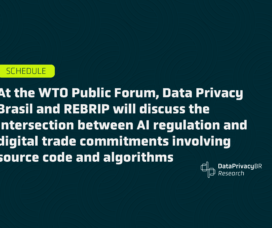
At the WTO Public Forum, Data Privacy Brasil and REBRIP will discuss the intersection between AI regulation and digital trade commitments involving source code and algorithms.
The WTO Public Forum 2023 will take place between September 12th and 15th in Geneva.
-

Data Privacy Brasil’s contribution to the Thematic Deep Dive of Artificial Intelligence and other Emerging Technologies of the Global Digital Compact
As other civil society organizations already pointed out, notable preference was given to the speech of Member States, UN agencies, and the private sector, at the expense of human rights civil society organizations, which prevented the speech that had been prepared by the DBPR and other civil society stakeholders.
-
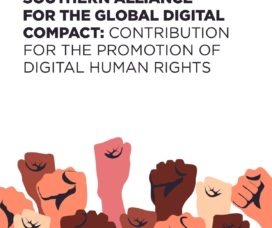
Southern Alliance for the Global Digital Compact
Responding to the call made by the United Nations, the Data Privacy Brazil Research Association, together with organizations from the Global South, presents a contribution to the Global Digital Compact.
-
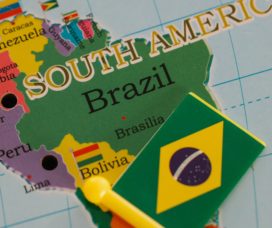
Data Privacy Brasil Research Association contributes to UN open call on the relationship between human rights and technical standard-setting processes
We received a call as an opportunity to submit suggestions to inform the OHCHR report on the relationship between human rights and standard-setting processes for new and emerging digital technologies.
-
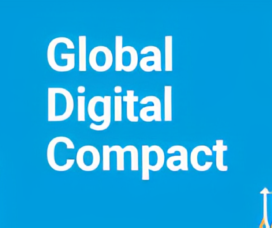
Let’s stay tuned for the Global Digital Compact
What is the Global Digital Compact and why is it important to keep an eye on it?
-
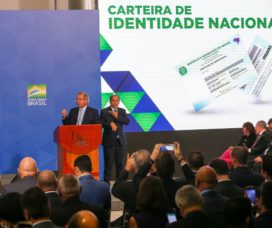
Why should we all pay attention to the Brazilian Digital ID system?
The implementation of digital identity systems is increasing around the world, especially in Global Southern countries. The model widely adopted is known as Big ID, promoted by or linked to public administration bodies which use centralized biometric databases to identify and authenticate citizens (Access Now, 2021).
DataPrivacyBr Research | Content under licensing CC BY-SA 4.0

